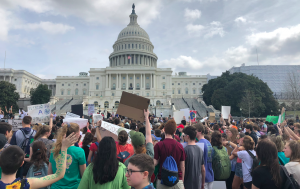“When in doubt, throw it out,” reads a sign on the new recycling bins in the Intercultural Center. Over the past year, improvements in Georgetown University’s waste management systems, such as single-stream recycling, were made by the understaffed Office of Sustainability, which consists of just two full-time staff members and a handful of student interns. Despite these efforts by the university toward a more sustainable campus, many students are ignorant or unaware of the extent they must also contribute to realizing this goal. For a good period of my freshman year, the myth that Georgetown does not recycle circulated in residence halls, causing students who were unaware of the school’s transition to mixed recycling to give up on their recycling habits.
Georgetown’s weakness in sustainability is not its failure to implement new programs but rather its shortcomings in bringing these improvements to light. For instance, in June 2019, I led a petition calling for the release of the environmental impact assessment of a solar project in southern Maryland, arguing that decisions in sustainability affecting the Georgetown student body should be communicated to us. This project was then later canceled by the Maryland Department of the Environment.
Georgetown students interested in being more sustainable are often lost in where to start. Programs like Core Pathways, a one-year interdisciplinary program focused on discussion-based learning on complex issues such as the climate crisis, provide a platform for like-minded students to discuss environmental issues. However, programs like these have limited seats and should be expanded to include others in a much-needed conversation about environmentalism at Georgetown.
Without individual actions towards sustainability, policy reform essentially becomes useless. As a student body, we share the same responsibility to help our campus and our world become cleaner and more eco-friendly. In addition, sustainability should not be categorized as an issue by itself but rather as an issue that crosses the realm of student housing, dining, and student organizations to name a few. When we finally see that sustainability affects multiple facets of our lives at once, we will have more incentive to act.
Though recycling and other programs are important to achieve campus sustainability, reducing the amount of waste we consume in our everyday lives is just as important. Despite not having a prominent Greek life, Georgetown’s club culture leads hundreds of student organizations on campus to host social events, utilizing large amounts of single-use plastics in the process. In response, a campaign by the student government’s sustainability team sought to reduce the use of single-use plastics by training clubs to buy products in bulk and to use the single-stream recycling bins for their events. In other words, the purpose of this campaign was to train clubs to think collectively about how the actions of their membership affect environmentalism, not just at Georgetown but the rest of the world.
The ways we live our everyday lives are just as important as the programs that the Office of Sustainability implements. While it’s great to have improved recycling and compost programs, students should start asking how our individual actions through energy consumption, the way we dress, and our diets affect the environment. In an era of climate change, institutional action and collective action are equal. We shouldn’t wait on others to act, we must reflect on our own actions and act individually. Without changes in our consumption habits, these new programs will not be effective at all. While recycling is something we should be proud of, we should aim to reduce our consumption and stop living in a world of excess. In the United States, Americans use approximately 500 million straws a day, so simple steps like skipping the straw in your drink will make a difference when done collectively.
As a student body, we must reflect on how our own actions affect sustainability on and off-campus. After all, it is in the values of this institution that we become men and women for others as part of a global community. While sustainability and environmental protection remain a personal choice, those who seek to become sustainable cannot simply expect the university to do the work for them; it requires changes to how the Georgetown community consumes resources and uses the opportunities around them, such as with recycling. The changes don’t need to be big, but in order for this to happen, students should work with the university than against it.
Image Credit: Emma Francois







[…] Waste | December 7, 2019 | No Comments […]